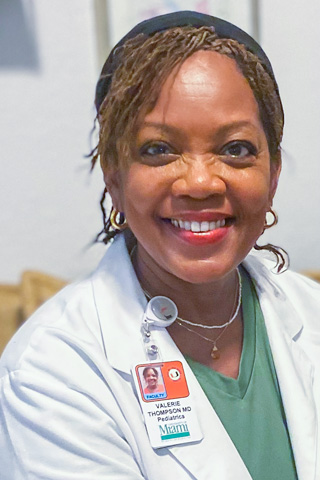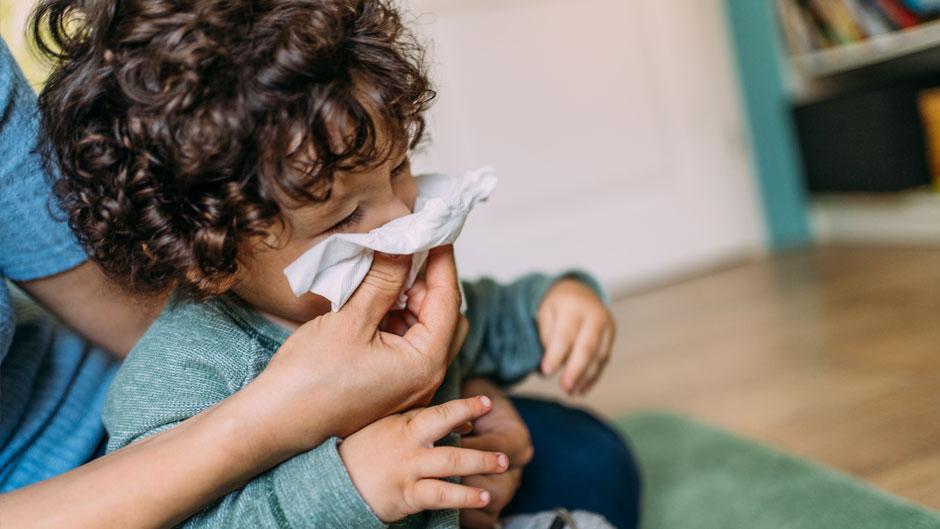Pediatricians are seeing it across the nation. And now physicians in South Florida are experiencing the same surge in respiratory syncytial virus, also known as RSV.
The virus typically afflicts young children and the elderly each winter, but it took a backseat to COVID-19 for the past three years. This fall, RSV emerged earlier than usual. And unfortunately, it is now reaching new heights.
 The United States Centers for Disease Control and Prevention (CDC) has noted a serious increase in RSV infections and hospitalizations this year. RSV is the most common cause of bronchiolitis (infection of the lungs) and pneumonia in American children younger than 1 year old. Annually, it has caused up to 300 deaths in children younger than 5, and up to 10,000 deaths among adults older than 65, CDC reports indicate.
The United States Centers for Disease Control and Prevention (CDC) has noted a serious increase in RSV infections and hospitalizations this year. RSV is the most common cause of bronchiolitis (infection of the lungs) and pneumonia in American children younger than 1 year old. Annually, it has caused up to 300 deaths in children younger than 5, and up to 10,000 deaths among adults older than 65, CDC reports indicate.
Dr. Valerie Thompson is the division chief for pediatric emergency medicine at the Miller School of Medicine. She also serves as the director of Pediatric Emergency Services at UHealth - University of Miami Health System and for the Jackson Health System, which means she works in the pediatric emergency rooms at Holtz Children’s Hospital, along with Jackson’s North, South, and West locations. She explains some of the particulars of RSV.
What is RSV and what are the symptoms?
RSV is a virus that has been around for a very long time. It may cause symptoms similar to a cold in adults, and in bigger children who are healthy, but it is more challenging for infants and toddlers.
Initially it looks like cough, congestion, or a runny nose that seems to worsen quickly. Patients may or may not have a fever. In young children, it often causes a loss of appetite or poor feeding, trouble sleeping. And toddlers and babies sometimes experience vomiting as well.
What are the most common ages you are seeing in the emergency room for RSV this fall?
Overall, children below 5 years old are still the most impacted by RSV. While infants are often more sheltered than toddlers and older children, they can contract the virus from other children or their parents because their immune system is immature.
Beyond RSV, all the seasonal viruses like influenza, COVID-19, and others, are more prevalent at this time.
Also, it’s important to note that anyone can get RSV, but who it’s impacting in a big way right now are newborns to children in the first few years of life.
Why do you think the virus is so prevalent this year?
The reasons are multifactorial. Many young children have been sheltered in their homes and everyone was wearing masks for the past three years, so now that most guidelines are not requiring masking, respiratory viruses that are usually seasonal still are (influenza, RSV, and others). Young kids who were born in late 2019 or in 2020 may have had less exposure to lots of people and less immunity to these same viruses.
Traditionally, we mainly worried about RSV in newborns or those born with cardiovascular or respiratory issues—like ex-preemies who were ventilated for a long time and have chronic lung conditions. Also, we worried about cardiac surgery patients, babies born with congenital heart disease, transplant patients, or anyone with altered immunity. Currently, we are seeing previously healthy babies and children who may struggle with RSV.
In older children, the potency of RSV may be related to the fact that their immune systems are challenged by several viruses at the same time, or it could be the potency of the RSV strain this season. But these are just theories at the moment.
How is RSV spread?
RSV can be spread by coughing, sneezing (through respiratory droplets), or by touching common surfaces (contact) with someone who has the virus.
How is it diagnosed?
It is initially indistinguishable from any of the other respiratory viruses. The only way to know if your child has RSV is if they are tested. This is done through a nose swab. Some of these tests can also detect influenza or COVID-19.
When should a parent take their child to an emergency room if they suspect RSV?
Not every baby that contracts RSV has serious complications. If your baby has a cold or a fever, I would visit your pediatrician. Also, if your child or baby is feeding well and they are very animated, are breathing comfortably and they are making wet diapers, they can stay home, with close parental observation, as things can change quickly.
If the child is having cold-like symptoms and is having trouble breathing, is vomiting while trying to drink or eat, or the parent notices their belly going up and down and their head bobbing when they are trying to breathe, or the color of their face or lips is changing to pale or bluish, those are all signs you need to call 911 or go to an emergency room. If a child or infant has severe trouble breathing, stopped breathing, and/or has lost consciousness, call 911.
How is RSV treated?
There is no medicine for RSV. The mainstay of treatment is supportive care. We do the same things for babies in the hospital with respiratory illnesses that you would do for yourself if you had a bad viral illness, except on a higher scale. We hydrate them using an IV, and we help them manage their secretions with frequent suctioning. So, the baby or child can rest.
We cannot take RSV out of a baby. But since feeding is a lot of work for them, we put in an IV to hydrate them, monitor their oxygen, treat the fever, and continue the IV fluids until they can get back to baseline. Some babies and children are treated with high flow oxygen in the intensive care unit, which provides support for those who need it. Some also need escalated interventions, like intubation and mechanical ventilation. And some patients also require albuterol and/or steroids for wheezing, but this is not a mainstay of RSV treatment.
Most children recover from RSV. But like any other widespread illnesses, with a big wave, many children are getting sick at the same time and that’s why the system is challenged right now.
What should parents do to help protect their children from RSV?
One of the most helpful things you can do is to wash your hands, and make sure your children do this often as well. RSV is respiratory, but it is also spread by contact. So, if you wipe your little one’s nose, wash your hands. If they are old enough, teach them to wash their hands. Hand sanitizer or soap and water are great.
Also, if your little one is sick, or even just has the sniffles, keep them home—not just from school, but from birthday parties, and other gatherings—to slow the spread.
If your child does appear to be getting a cold, you can help them by keeping them very well hydrated. Often, very young infants are admitted due to poor feeding. For babies, since they have a diet that is primarily liquid, it is imperative that they stay hydrated. If they are over a year old, parents can be creative with hydration. Some ideas include popsicles, juice, soup, gelatin, or fun sippy cups. If they don’t want to eat, that’s OK. Because when they feel better, their appetite will improve. But if the child is refusing to eat, still encourage them to drink. You can measure their level of hydration by their alertness, wet diapers, whether they shed tears when they cry, and the child’s overall color.

